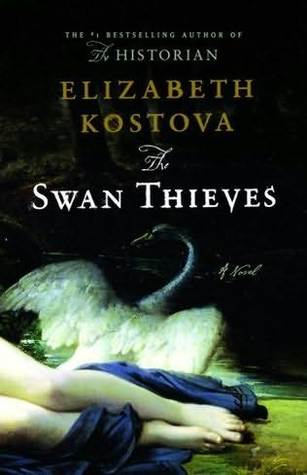The Swan Thieves by Elizabeth Kostova

Krysten’s Review
I picked up The Swan Thieves from a friend’s bookshelf (having told her I needed something new to read), and her reaction made me feel almost like I had to read it. The back cover blurb didn’t strongly appeal to me, but I thought I’d give it a try. After initially finding it difficult to get into, The Swan Thieves turned out to be much better than I initially thought… though not without its flaws.
Pros
+Having not read any art historical fiction novels, I found the genre to be fresh and interesting. (Though I did get tired of reading about the type of brushstrokes and how paint smells and what specific colors were used, etc.)
+I liked the mystery element — it was different from the usual murder mysteries I read.
+I learned a lot of new words (and then promptly forgot them all) and some history of art.
+Once I got used to it, I did like the switching of perspectives. It was a little confusing at first, but I liked seeing things from other characters’ points of view. (But where was Robert’s? And why weren’t Beatrice’s sections in first person, too?)
Cons
-The prologue bothered me, especially when I finally finished the book. It’s not really that gripping — it’s easy to forget, but it’s something you need to remember at the end.
-Time. It’s hard to follow how much time has passed. Kostova will spend pages and pages on one day, and then all of a sudden, months and months have gone by, and it’s next year. And why is Marlow looking back at the story 10 years later?
-Every character has the same voice, and I found it hard to believe that everyone was really that well spoken. I can see it of Marlow, as he has an advanced degree. But even Kate and Mary spoke the same way, and as self-described “artists,” or even being so young in Mary’s case, I would have thought they’d be less eloquent (bombastic?).
-Robert was not likable. At all. Why were Mary and Kate so head over heels in love with him? He had no redeeming qualities, except for being a good painter. And while we’re talking about unrealistic obsessions… I thought it was a stretch to base the entire premise of a 600-page book on his obsession with a woman whose portrait he saw once through a crowd in a museum. An obsession that spanned decades, that ruined his marriage, that got him arrested and landed him in a psychiatric facility, that caused him to go mute for months. We never really find out what sparked this obsession. Yes, maybe he was mentally ill, but I need a better reason.
-Too. Much. Description. Of EVERYTHING. I found myself skipping entire passages because Kostova was going on and on about the way Robert’s hair curled or the history of Marlow’s father’s house or the way characters mixed paint. And why did we need Mary’s entire life story? Why did we have to hear about how many times Kate vomited after trying to pick out a hat for her mother? You probably could have cut 100 pages of this book just by editing these descriptions.
-I thought Marlow and Mary’s relationship seemed forced (albeit not a surprise, given the way he referred to his wife throughout the book, with no name or description) and one sided. I sure wouldn’t be hopping on a plane to Mexico with my ex-boyfriend’s doctor who’s 20 years older than I am, having just met him! If only Mary knew how he thought about women — the one at the museum he wanted to pin against a countertop, the way Kate’s breasts moved under her shirt, etc. This was a big turn-off for me. What was the point of all this? To make us think that maybe she (whoever he was having perverted thoughts about at the time) would end up being the mysterious wife? If so, to what end?
-The ending seemed false, too easy, forced. Marlow gets back from France and tells Robert what he discovered, and all of a sudden he starts talking again. He’s all thankful to Marlow for figuring this out, but… he already knew all of it! And why isn’t he upset that his doctor apparently has no ethics and totally overstepped his bounds (even more than he realizes, in fact)? And why is Marlow convinced Robert is OK, just because he finally said a few words? It’s not like he actually got any treatment, other than medication. And then suddenly he’s off on his merry way, with nowhere to go, no follow-up appointments or anything. Really?
The book was enjoyable, and I did actually learn a few things, but I had to suspend my disbelief too many times in order to make it through. Fiction isn’t real life, of course, but even fantasy and sci-fi novels have to be realistic and logical enough for readers to believe. One or two inconsistencies would have probably been OK, but The Swan Thieves is chock full of them.





